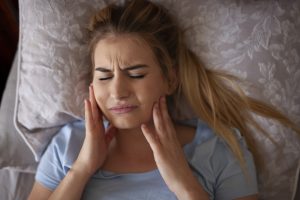 Bruxism is a condition associated with teeth grinding, causing pain in your teeth, jaw muscles, and the joints that connect your jawbone to your skull. Over time, it can also cause teeth to become fractured, worn down, loosened, or lost. This condition is common, affecting approximately 10% of adults and 15% of children.
Bruxism is a condition associated with teeth grinding, causing pain in your teeth, jaw muscles, and the joints that connect your jawbone to your skull. Over time, it can also cause teeth to become fractured, worn down, loosened, or lost. This condition is common, affecting approximately 10% of adults and 15% of children.
Aside from pain and damage to your teeth and jaw, other symptoms of bruxism include:
- Sleep disruption
- Headaches or facial pain
- Ear aches
- Pain while eating
- Jaw locking
Bruxism can occur when you’re awake or asleep. Grinding your teeth or clenching your jaw while awake is often tied to strong emotions, such as anxiety, anger, or stress. It can also occur if you’re concentrating on something. If you experience bruxism while sleeping, you may not be aware of it and may be grinding your teeth more strongly than if you were awake, making it a potentially more damaging and difficult to detect form of this condition.
In addition to your emotional state, bruxism is also linked to lifestyle habits such as the consumption of alcohol, cigarettes, recreational drugs, and excessive caffeine (equivalent to six or more cups of coffee per day). Taking selective serotonin reuptake inhibitors (SSRIs) can also increase your likelihood of experiencing bruxism.
Treatment for bruxism may include the usage of a night guard while sleeping. This orthotic device protects your teeth and the muscles and joints of your jaw from grinding. Your dentist may also recommend lifestyle changes and therapies that target potential root causes of bruxism, as well as a review of any medications you’re taking to determine if they are contributing to the problem.
If you are experiencing bruxism or symptoms that may indicate teeth grinding while sleeping, you can receive specialized dental care at Flushing Hospital Medical Center’s Dental Department. To schedule an appointment, please call (718) 670-5521.
All content of this newsletter is intended for general information purposes only and is not intended or implied to be a substitute for professional medical advice, diagnosis or treatment. Please consult a medical professional before adopting any of the suggestions on this page. You must never disregard professional medical advice or delay seeking medical treatment based upon any content of this newsletter. PROMPTLY CONSULT YOUR PHYSICIAN OR CALL 911 IF YOU BELIEVE YOU HAVE A MEDICAL EMERGENCY.
